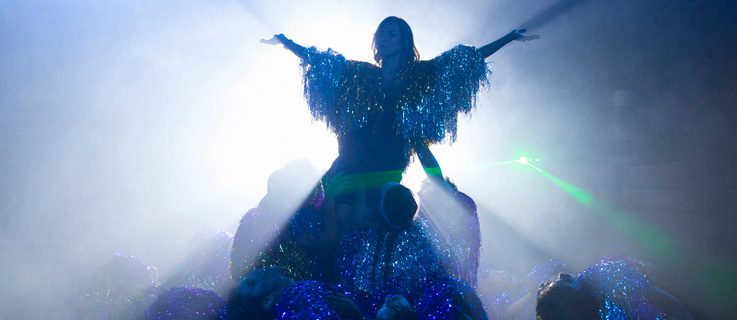The question of identity is more topical than ever, with many films at the 2017 Berlinale exploring one’s own role, the way one perceives oneself, and the way one distinguishes oneself from others. How do the impressions of the Berlinale Bloggers differ, who after all come from different cultural backgrounds themselves?
 Nathanael Smith – United Kingdom: Competition film Wild Mouse, directed by and starring Josef Hader, features a moment of bleak familiarity for film critics. He is fired from his long-standing position as a music critic for a Vienna paper. Hader pathetically intones “I’ve been a music critic for 20 years. I don’t know how to do anything else.” The film then goes on to lose its way in an insubstantial plot with too many narrative threads, but this one moment resonated with me long after the film had finished. It’s hard not feel obsolete as a critic among a cacophony of online voices who write for free. In this one perfectly played moment I saw something of myself reflected on the big screen. It was a wholly unhappy sight.
Nathanael Smith – United Kingdom: Competition film Wild Mouse, directed by and starring Josef Hader, features a moment of bleak familiarity for film critics. He is fired from his long-standing position as a music critic for a Vienna paper. Hader pathetically intones “I’ve been a music critic for 20 years. I don’t know how to do anything else.” The film then goes on to lose its way in an insubstantial plot with too many narrative threads, but this one moment resonated with me long after the film had finished. It’s hard not feel obsolete as a critic among a cacophony of online voices who write for free. In this one perfectly played moment I saw something of myself reflected on the big screen. It was a wholly unhappy sight.
 Philipp Bühler – Germany: I, of course, felt personally affected by Josef Hader's Wild Mouse, too: a Viennese music critic is fired, following which his identity goes on a roller-coaster ride. People from other occupational groups can surely also identify with this. In films, identities are persistently threatened, shaken, changed, or – usually less satisfactorily – consolidated. Cinema without questions of identity is actually hardly conceivable. What is more, such questions are attributable to the interplay of drama, role and audience, which is to say, in the medium itself. It is difficult to say whether the very specific Austrian humour of Josef Hader will also be understood in non-German-speaking countries.
Philipp Bühler – Germany: I, of course, felt personally affected by Josef Hader's Wild Mouse, too: a Viennese music critic is fired, following which his identity goes on a roller-coaster ride. People from other occupational groups can surely also identify with this. In films, identities are persistently threatened, shaken, changed, or – usually less satisfactorily – consolidated. Cinema without questions of identity is actually hardly conceivable. What is more, such questions are attributable to the interplay of drama, role and audience, which is to say, in the medium itself. It is difficult to say whether the very specific Austrian humour of Josef Hader will also be understood in non-German-speaking countries.
 Ahmed Shawky – Egypt: Watching Aki Kaurismäki's The Other Side of Hope makes you think about the gift of having a cinematic identity, of being able to make the same film again and again yet keeping it fresh and touching every time. When it comes to refugee topics, he managed to make a film very different to those we have been watching for years.
Ahmed Shawky – Egypt: Watching Aki Kaurismäki's The Other Side of Hope makes you think about the gift of having a cinematic identity, of being able to make the same film again and again yet keeping it fresh and touching every time. When it comes to refugee topics, he managed to make a film very different to those we have been watching for years.
 Camila Gonzatto – Brasil: When do you start to call yourself a filmmaker? Many filmmakers see short films as a way to get into cinema. Others now use them as a space of freedom for linguistic experimentation. This year's competitive short film exhibition features films that use both approaches, from an animation about cats undergoing laboratory experiments to Brazilian brega music and on to mobile phone images recorded at an Argentinean rodeo. The short film Everything (Irish-American co-production) by David O'Reilly encapsulates all these possibilities by proposing a universe in which everything is connected, be it an atom, an animal, a planet or man himself. The film is also part of an interactive game due to be launched in 2017.
Camila Gonzatto – Brasil: When do you start to call yourself a filmmaker? Many filmmakers see short films as a way to get into cinema. Others now use them as a space of freedom for linguistic experimentation. This year's competitive short film exhibition features films that use both approaches, from an animation about cats undergoing laboratory experiments to Brazilian brega music and on to mobile phone images recorded at an Argentinean rodeo. The short film Everything (Irish-American co-production) by David O'Reilly encapsulates all these possibilities by proposing a universe in which everything is connected, be it an atom, an animal, a planet or man himself. The film is also part of an interactive game due to be launched in 2017.
 Sarah Ward – Australia: A glint in the eye can say so much, both about who a person is, and who they want to be. It can act as a statement of intent, blazing with determination to strive towards a different future, while betraying hidden fears, thoughts and feelings. All of the above radiates from Lolita Chammah’s face in Laura Schroeder’s Barrage, playing a woman who returns to visit the daughter (Thémis Pauwels) she left with her own mother (Isabelle Huppert) a decade earlier, and conveying hope for a new life and bond, as well as anxiety about past choices and wrongs, along with it. That Chammah is Huppert’s real-life daughter adds an extra layer to a tale about one child breaking free from a parent while trying to learn to be one — and to be herself.
Sarah Ward – Australia: A glint in the eye can say so much, both about who a person is, and who they want to be. It can act as a statement of intent, blazing with determination to strive towards a different future, while betraying hidden fears, thoughts and feelings. All of the above radiates from Lolita Chammah’s face in Laura Schroeder’s Barrage, playing a woman who returns to visit the daughter (Thémis Pauwels) she left with her own mother (Isabelle Huppert) a decade earlier, and conveying hope for a new life and bond, as well as anxiety about past choices and wrongs, along with it. That Chammah is Huppert’s real-life daughter adds an extra layer to a tale about one child breaking free from a parent while trying to learn to be one — and to be herself.
 Yun-hua Chen – China: A person’s identity is defined to a great extent through their relationship with others, so many filmmakers seek existential answers by portraying conversations that aim to reach a deeper level of understanding. In much the same way as Huang Hui-chen wishes to understand her mother’s thoughts so that both can reflect upon themselves and reconnect with one another in Small Talk, the question of what the director’s aunt has done in Lissette Orozco’s documentary Adriana’s Pact is really about discovering where one comes from and how one lives with the idea that evil is a part of oneself. The existential question in Call Me By Your Name is sexual, on the other hand, and involves seeking answers about who one loves and how the concept of love along with all its joy and pain can be gracefully perceived as a natural part of life.
Yun-hua Chen – China: A person’s identity is defined to a great extent through their relationship with others, so many filmmakers seek existential answers by portraying conversations that aim to reach a deeper level of understanding. In much the same way as Huang Hui-chen wishes to understand her mother’s thoughts so that both can reflect upon themselves and reconnect with one another in Small Talk, the question of what the director’s aunt has done in Lissette Orozco’s documentary Adriana’s Pact is really about discovering where one comes from and how one lives with the idea that evil is a part of oneself. The existential question in Call Me By Your Name is sexual, on the other hand, and involves seeking answers about who one loves and how the concept of love along with all its joy and pain can be gracefully perceived as a natural part of life.
 Andrea d’Addio – Italy: Here, the identity is that of Elio (played by Timothée Chalamet) the central character in Call Me By Your Name by Luca Guadagnino. He is 17, and despite having a girlfriend with whom he spends summer by the Italian lakes where he goes every year with his family, he is not disconcerted to find himself attracted to the male American university student helping his lecturer father with his university research. Elio does not turn away from his desires, but embraces the stirrings of his adolescence without fear of being made vulnerable, neither in the face of his parents nor with regard to love itself, taking on all the burden of sadness which is bound to come when the two lovers have to say goodbye.
Andrea d’Addio – Italy: Here, the identity is that of Elio (played by Timothée Chalamet) the central character in Call Me By Your Name by Luca Guadagnino. He is 17, and despite having a girlfriend with whom he spends summer by the Italian lakes where he goes every year with his family, he is not disconcerted to find himself attracted to the male American university student helping his lecturer father with his university research. Elio does not turn away from his desires, but embraces the stirrings of his adolescence without fear of being made vulnerable, neither in the face of his parents nor with regard to love itself, taking on all the burden of sadness which is bound to come when the two lovers have to say goodbye.
 Julia Thurnau - Norway: The Berlinale, where the majority of films are made by white, comfortably-off men – exactly the people who are currently in the corridors of power. Privileged white men reflect with sensitivity on the universe (From the Balcony), imagine how women rise up against the patriarchal establishment (Tiger Girl) or consider how absent fathers can make it up to their children Bright Nights (Helle Nächte). A minority of the films are made by “the others”, that is to say women, gays and all those who do not have easy access to big budgets or question the predominant structures. They have their own prize, the Teddy Award.
Julia Thurnau - Norway: The Berlinale, where the majority of films are made by white, comfortably-off men – exactly the people who are currently in the corridors of power. Privileged white men reflect with sensitivity on the universe (From the Balcony), imagine how women rise up against the patriarchal establishment (Tiger Girl) or consider how absent fathers can make it up to their children Bright Nights (Helle Nächte). A minority of the films are made by “the others”, that is to say women, gays and all those who do not have easy access to big budgets or question the predominant structures. They have their own prize, the Teddy Award.
 Dorota Chrobak – Poland: An artist can turn anything into a work of art. Literally anything. So what happens when an artist begins to live under one roof with another artist? Does what he/she thinks and feels still belong to him/her, or can it be appropriated by the other person? A Heart of Love – Director's Cut, the second film by Łukasz Ronduda, is a brilliant and entertaining portrayal of the traps that occur in a relationship between two self-centred artists. "You stole my dream!", Zuzanna shouts at Wojtek at one point. At first, this sounds like a joke. In fact, it's a cry of despair from someone who is gradually losing her identity and individuality. The worst nightmare that can happen to someone? You look into the mirror and see a stranger's face.
Dorota Chrobak – Poland: An artist can turn anything into a work of art. Literally anything. So what happens when an artist begins to live under one roof with another artist? Does what he/she thinks and feels still belong to him/her, or can it be appropriated by the other person? A Heart of Love – Director's Cut, the second film by Łukasz Ronduda, is a brilliant and entertaining portrayal of the traps that occur in a relationship between two self-centred artists. "You stole my dream!", Zuzanna shouts at Wojtek at one point. At first, this sounds like a joke. In fact, it's a cry of despair from someone who is gradually losing her identity and individuality. The worst nightmare that can happen to someone? You look into the mirror and see a stranger's face.
 Pablo López Barbero – Spain: The film Una Mujer Fantástica (A Fantastic Woman) is the struggle of someone who is labelled as different in a prejudiced, conservative and hostile society. Its protagonist is a transsexual woman who has to stand up to being humiliated by the family of her recently deceased boyfriend. Despite these attacks, she ends up becoming a brave, independent person who is stronger than ever, more sure of herself and more capable of finding her place in the world. But was all that suffering really necessary? Unfortunately, it was.
Pablo López Barbero – Spain: The film Una Mujer Fantástica (A Fantastic Woman) is the struggle of someone who is labelled as different in a prejudiced, conservative and hostile society. Its protagonist is a transsexual woman who has to stand up to being humiliated by the family of her recently deceased boyfriend. Despite these attacks, she ends up becoming a brave, independent person who is stronger than ever, more sure of herself and more capable of finding her place in the world. But was all that suffering really necessary? Unfortunately, it was.
